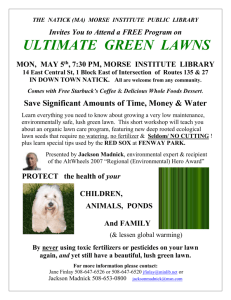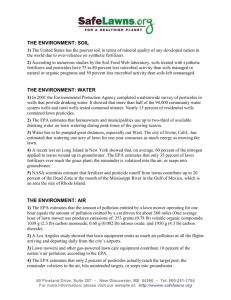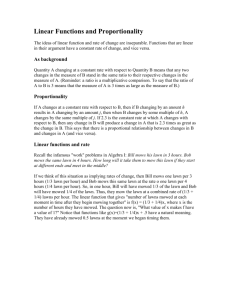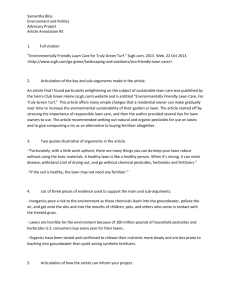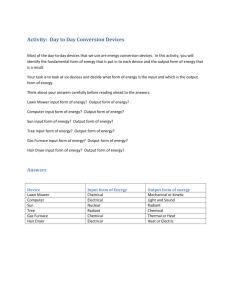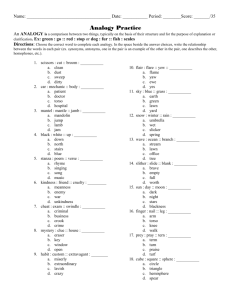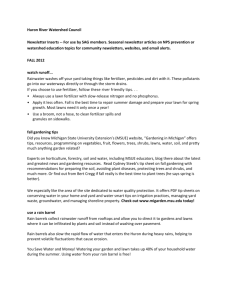The Ecological, Economic & Educational Impacts of the Suburban
advertisement
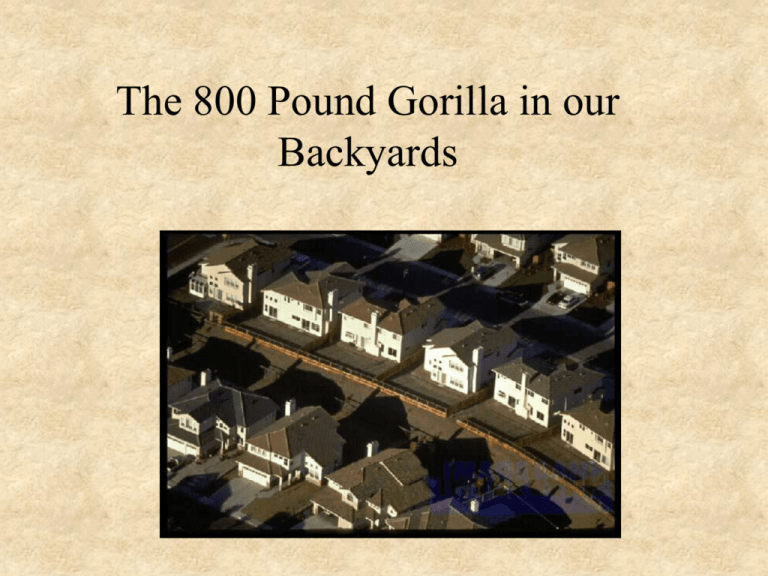
The 800 Pound Gorilla in our Backyards Why Focus on the Suburban Lawn? • A high level of American’s interaction with the environment occurs here – need to teach the right lessons • Third largest “crop” in the U.S. – and growing! • Especially important for urban watersheds like the N.W. Branch – can be the major source of pollutants The Lawn Ecosystem in the U.S. • Imported from Europe – is an artificial ecosystem • Only able to become widespread because of technological innovations The National Costs of the Lawn Ecosystem • Americans spend Percent Lawn Maintenance Expense for the United States 25 Billion dollars a Seed Ot her year on 2% 8% landscaping • $100 for every Equipment 20% person in the country Labor Pest icide 60% • $380 for every 3% Gas 3% Fert ilizer household 4% The Costs Associated with Lawn Care Landowner Total Cost Cost/Person Cost/Hectare Homeowners $25 Billion $379.00 $2,500/hectare Farmers $57 Billion Not available $420/hectare • The average homeowner spends six times more per hectare on yard care than the average farmer spends tending crops. The Ecological Footprint Concept An ecological footprint is a way of translating the environmental impacts of an activity into the land needed to sustain that activity ad infinitum Ecological Footprint of the Lawn at the National and State Level Input Total Energy Use (GJ) Total Footprint (Hectares) Footprint per Hectare (Hectares) Pennsylvania National Pennsylvania National Pennsylvania National Land N/A N/A 548,350 11,600,000 1.0 1.0 Water 7.7x105 6.1x106 9,625 76,500 0.018 0.007 Fuel 6.8x106 9.1x107 85,000 1,138,000 0.155 0.098 Machine Production Fertilizer Production Pesticide Production Total 8.8x105 4.4x107 11,000 550,000 0.02 0.047 1.4x106 1.32x107 17,500 165,000 0.032 0.014 4.8x105 4.8x106 600 60,000 0.001 0.004 1.03x107 1.59x108 672,075 13,589,500 1.226 1.170 •Nationally we use enough energy in lawn care every year to supply 1.5 million American households with power for a year. •1/5 hectare of land is needed to provide enough energy to care for one hectare of lawn Estimated National and State Level Air Pollution from Lawn Care Input Particulate Matter per Hectare NOx and HC's per Hectare Total CO per Hectare Total CO2 per Hectare Total NH3 per Hectare National 11.5 kg/yr. 403 kg/yr. 1,910 kg/yr. 806 kg/yr. 0.017 kg/yr. PA 14 kg/yr. 540 kg/yr. 2,537 kg/yr. 1,082 kg/yr. 0.032 kg/yr. • Although used infrequently, lawn equipment creates a significant amount of air pollution because small engine emission standards are more lenient than large engine standards. • Lawn equipment produces between 10-30 times as much air pollution per liter of gas as a car. The Lawn’s Impact on Biota •Very few studies on this topic •Studies show that urban growth favors generalist and exotic species Comparison of Biota with Different Maintenance Regimes Maintenance Regime High Maintenance Medium Maintenance Low Maintenance Number of Plant Species Found 2 species 5 species 16 species Percentage of 0 percent Native Species Found 0 percent 56 percent Impacts of Lawns on Soil & Water • 1/5 of all pesticides are used on lawns – 10x higher than farmer’s use • 10 percent of water pollution comes from lawn care • 1/3 of household water use is used in lawn care Runoff and Soil Loss • Rain water infiltration is 2.5 greater in natural fields than the compacted lawns of suburbia • Reduces groundwater recharge • Makes streams more flashy • Increases erosion rates What to do? Solutions Grow from a Sense of Place – Design for the Place Where You Live Use poorly draining land as a pond or install a rain garden there What to do? Design and maintain yard using ecological accounting Example: Integrated pest management vs. pesticides What to do? Design and maintain yards with Nature instead of against it Example: yard waste – compost vs. landfill What to do? Make nature visible •People become interested in nature through their yards & parks •Helps them make the connection between themselves and the environment around them Concrete Examples • Rain Barrels • Composters More Examples • Urban Shared Gardens • Rain Gardens Still more • Reduce lawn sizes • Eliminate exotics/plant perennials & natives More Examples • Green roofs • Plant trees
